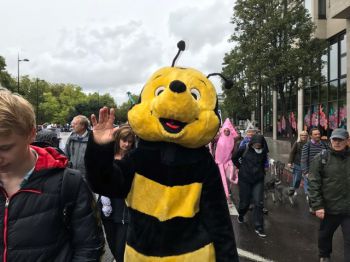Ministerial role for Sussex professor in wildlife manifesto led by Chris Packham
By: Stephanie Allen
Last updated: Thursday, 4 October 2018



A University of Sussex professor has become honorary ‘Minister of Pesticides’ in a public manifesto for wildlife, created and led by naturalist and TV presenter Chris Packham.
Professor Dave Goulson, Professor of Biology in the School of Life Sciences, has written a short essay on the negative environmental impacts of pesticides for A People’s Manifesto for Wildlife.
His is one of 18 essays by a variety of ‘Ministers’ which highlight some of the most critical concerns affecting the UK landscape, published alongside a set of ‘proposals’ which suggest ways to tackle the problems identified, from broad governmental policies to more localised initiatives.
The manifesto is intended to present a series of informed ideas from a parliament of strong, independent voices, accessible to everyone with an interest in the British countryside. Contributors include columnist George Monbiot and author Robert Macfarlane as well as other academics, ecologists, environmental campaigners, a solicitor and two students.
Professor Goulson said: “I’m proud to be involved in this initiative. Academic research is all well and good, but the state of our dwindling wildlife is so dire that it is time to take action.”
Several Ministers gave speeches linking to the manifesto at the recent ‘People’s Walk for Wildlife’ in London, held on 22 September.
Professor Goulson took to the stage in a bee costume to speak about the harmful impacts of pesticides and was captured on camera by Chris Packham himself.
Professor Goulson said: “The problems our environment faces are all ultimately the result of the actions of people, and hence the solution to the problems also lies in our collective hands, if only we can pull together. It is vitally important for scientists and conservationists to communicate and engage with the general public about these issues.”
Over the years, Professor Goulson, who is a Fellow of the Royal Entomological Society, and a Fellow of the Royal Society of Edinburgh, has regularly spoken out about the dangers of neonicotinoid pesticides and has published over 200 scientific articles on the ecology of bees and other insects.
He co-founded the Bumblebee Conservation Trust in 2006 and later was a driving force behind the reintroduction of the short-haired bumblebee to Kent’s coastal marshes. In 2010, he was named ‘Social Innovator of the Year’ by the BBSRC and, in 2013, won the Marsh Award for Conservation Biology from the Zoological Society of London.
In 2015, he was then named in the top ten of BBC Wildlife Magazine’s ‘Wildlife Power List’, sitting alongside Sir David Attenborough as one of Britain’s most important conservation heroes.
